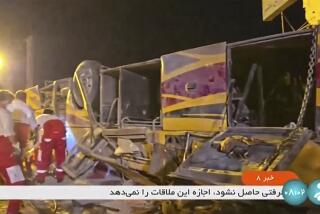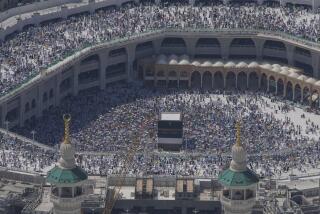Iraq Defies Air Embargo by Flying Out Pilgrims
- Share via
CAIRO — In carefully measured defiance of the United States and U.N. sanctions, government-owned Iraqi Airways made its first international flight in more than six years Wednesday, carrying 104 Muslim pilgrims to Saudi Arabia.
The Saudi government said it was not informed in advance of the Iraqi flight and initially sent aloft two military planes to meet the passenger jet.
But when it was learned that the aircraft was carrying religious pilgrims, the Iraqi pilot was permitted to land at Jidda’s King Abdulaziz International Airport.
Iraqi television treated the crack in the air embargo as further proof that the country led by President Saddam Hussein is edging back to a position of acceptance and respectability within the region.
Scenes of the Soviet-built Ilyushin jet’s morning takeoff from a military airport south of Baghdad were broadcast repeatedly on Iraqi television.
“I consider this day as a new birthday for me,” said the pilot, Moayed Younis, who made a “V for victory” sign as the plane--smeared with the blood of two ceremonially slaughtered sheep--took off.
In New York, the U.S. ambassador to the United Nations, Bill Richardson, denounced the flight as a “flagrant violation” of U.N. sanctions and said the United States will seek a strong condemnation by the Security Council.
The flight fit Hussein’s pattern of probing for weak points in the U.S.-led international coalition that has sought to isolate the Baghdad regime since Iraq’s defeat in the Persian Gulf War in 1991.
Although the ban on air travel has been in place since Iraq’s August 1990 occupation of Kuwait, support for sanctions generally has been waning in the international community. And Arab leaders would have a hard time condemning a flight taking pilgrims on the annual hajj, or pilgrimage, to Mecca. The journey is a sacred obligation required at least once in the lifetime of every Muslim who can afford it.
Saudi Arabia, which along with Kuwait has been the United States’ staunchest Arab ally in the effort to contain Hussein, is in an especially delicate position.
The Saudi monarch, King Fahd ibn Abdulaziz al Saud, bears the title Custodian of the Holy Mosques and has a traditional duty to facilitate the travel of the approximately 2 million pilgrims to Mecca who arrive each year.
Libya has arranged flights for its pilgrims for three years running despite Security Council protests.
Although under an air embargo designed to force it to turn over suspects in the 1988 explosion of a Pan Am jet over Lockerbie, Scotland, Libya argues that U.N. sanctions cannot supersede a sensitive religious matter like the pilgrimage.
Wednesday’s flight was the latest symbolic victory claimed by the Iraqi leader over the past year.
In August, he successfully sent Republican Guard troops to the aid of a Kurdish faction in northern Iraq, in effect reasserting sovereignty over his entire territory.
In December, Iraq began pumping oil again for the first time since the war under the United Nations’ oil-for-food resolution that permits limited sales of Iraqi oil for humanitarian purposes.
Although several countries, including Russia and France, recently have been pushing for a rehabilitation of Iraq, U.S. Secretary of State Madeleine Albright made clear in a speech two weeks ago that U.S. policies directed against the current leadership will continue for “as long as it takes.”
She said the United States believes that Hussein can never be trusted based on his past actions, but the U.S. government would be willing to enter into a dialogue with, and possibly assist, a post-Hussein government.
More to Read
Sign up for Essential California
The most important California stories and recommendations in your inbox every morning.
You may occasionally receive promotional content from the Los Angeles Times.













